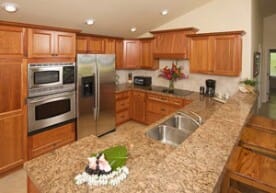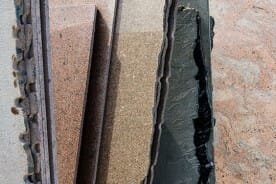Countertop Materials
Kitchen Countertops > About Us
Countertop Materials • Unusual Countertops
Today's kitchen designers and architects can select from a variety of countertop materials, such as laminates, granite, and stainless steel; each material is best suited for certain applications. One material may be more scratch resistant; another may be more heat resistant. Along with appearance, cost, durability, and porosity, you should consider these factors when selecting a countertop for your kitchen. You may even wish to use one countertop material in most of your kitchen and a different material, such as a butcher block top, for your kitchen island.
Popular Countertop Materials
-
 Granite –
Granite is a luxury countertop material which adds elegance
and beauty to any kitchen. It is a hard-wearing, heat resistant,
and durable surface material. However, granite does require
periodic sealant applications. Furthermore, it is expensive,
vulnerable to stains and cracks, and available in limited sizes
and colors.
Granite –
Granite is a luxury countertop material which adds elegance
and beauty to any kitchen. It is a hard-wearing, heat resistant,
and durable surface material. However, granite does require
periodic sealant applications. Furthermore, it is expensive,
vulnerable to stains and cracks, and available in limited sizes
and colors. -
 Solid Surface –
Corian, Wilsonart, Avonite, and Swanstone are popular brands
of solid surface countertop materials which can be custom fabricated to
your exact specifications. Solid surface materials are seamless,
stain resistant, and are available in a wide variety of patterns and
colors. Scratches and marks can be easily repaired. However,
solid surface materials are fairly expensive, and their surfaces can be
marred by hot pans and stains.
Solid Surface –
Corian, Wilsonart, Avonite, and Swanstone are popular brands
of solid surface countertop materials which can be custom fabricated to
your exact specifications. Solid surface materials are seamless,
stain resistant, and are available in a wide variety of patterns and
colors. Scratches and marks can be easily repaired. However,
solid surface materials are fairly expensive, and their surfaces can be
marred by hot pans and stains. -
 Laminates –
Laminate countertops made by Formica, Wilsonart, and Nevamar
are made of plastic-coated synthetics, are available in standard lengths
as well as custom sizes, and have a smooth, easy-clean surface.
Laminate materials are durable and affordable, and are offered in many
colors and patterns. China and glass are not likely to break on
impact. However, chips and scratches are hard to repair, seams
are visible, and optional edge treatments can add to the cost.
Laminates –
Laminate countertops made by Formica, Wilsonart, and Nevamar
are made of plastic-coated synthetics, are available in standard lengths
as well as custom sizes, and have a smooth, easy-clean surface.
Laminate materials are durable and affordable, and are offered in many
colors and patterns. China and glass are not likely to break on
impact. However, chips and scratches are hard to repair, seams
are visible, and optional edge treatments can add to the cost. -
 Butcher Block –
Wood countertops add a warm, mellow appearance to a kitchen,
and they are available in a wide range of hardwoods and finishes.
Maple and oak butcher block countertops are popular choices. They
are fairly easy to clean and maintain, and can be resurfaced and
resealed as required. They are also fairly noise-absorbent.
However, wood countertops can stain, scratch, and scorch, and they can
be damaged by water if not properly oiled or sealed.
Butcher Block –
Wood countertops add a warm, mellow appearance to a kitchen,
and they are available in a wide range of hardwoods and finishes.
Maple and oak butcher block countertops are popular choices. They
are fairly easy to clean and maintain, and can be resurfaced and
resealed as required. They are also fairly noise-absorbent.
However, wood countertops can stain, scratch, and scorch, and they can
be damaged by water if not properly oiled or sealed. -
 Ceramic Tile –
Ceramic tile is an inexpensive and long-lasting countertop
choice which can be installed by handy homeowners. Ceramic tiles
resist heat, and are offered in many sizes, colors, and textures.
They can add a colorful design impact to any kitchen. However,
tiles can sometimes chip or crack, and countertops generally require
thicker grade tiles than walls. In addition, ceramic tile
countertops may be difficult to clean because of their uneven surface
and grout lines.
Ceramic Tile –
Ceramic tile is an inexpensive and long-lasting countertop
choice which can be installed by handy homeowners. Ceramic tiles
resist heat, and are offered in many sizes, colors, and textures.
They can add a colorful design impact to any kitchen. However,
tiles can sometimes chip or crack, and countertops generally require
thicker grade tiles than walls. In addition, ceramic tile
countertops may be difficult to clean because of their uneven surface
and grout lines. -
 Stainless Steel –
Counters made of stainless steel are heat resistant and
offer a decidedly contemporary style to a kitchen. Stainless
countertops will be made to your specifications and offer seamless
durability. They are durable, hygienic, and easy to clean.
However, they are noisy, expensive to fabricate, and may show dents,
cut marks, and smudges.
Stainless Steel –
Counters made of stainless steel are heat resistant and
offer a decidedly contemporary style to a kitchen. Stainless
countertops will be made to your specifications and offer seamless
durability. They are durable, hygienic, and easy to clean.
However, they are noisy, expensive to fabricate, and may show dents,
cut marks, and smudges. -
 Concrete –
The recent popularity of concrete countertops is due to
improved concrete treatments, additives, and decorative finishes.
Concrete resists scratches and heat, and is well-suited for custom
shapes and sizes. However, it is heavy, expensive to install,
and offers a somewhat industrial appearance.
Concrete –
The recent popularity of concrete countertops is due to
improved concrete treatments, additives, and decorative finishes.
Concrete resists scratches and heat, and is well-suited for custom
shapes and sizes. However, it is heavy, expensive to install,
and offers a somewhat industrial appearance. -
 Marble –
Seldom seen in an entire kitchen, marble provides a look
of luxury to select areas such as islands and a cool, smooth surface
for baking and candy-making activities. Marble is waterproof and
heatproof. However, it is very expensive, can stain easily, and
must be resealed periodically because it is porous.
Marble –
Seldom seen in an entire kitchen, marble provides a look
of luxury to select areas such as islands and a cool, smooth surface
for baking and candy-making activities. Marble is waterproof and
heatproof. However, it is very expensive, can stain easily, and
must be resealed periodically because it is porous. -
 Soapstone –
Often seen in historic houses, soapstone countertops and
sinks are often found in kitchens today. Soapstone is usually a
deep, dark gray, has a smooth, talcose feel, and resists stains.
However, soapstone must be periodically treated with mineral oil, and
even then, it may eventually crack and darken.
Soapstone –
Often seen in historic houses, soapstone countertops and
sinks are often found in kitchens today. Soapstone is usually a
deep, dark gray, has a smooth, talcose feel, and resists stains.
However, soapstone must be periodically treated with mineral oil, and
even then, it may eventually crack and darken. -
 Engineered Stone –
Engineered stone is made from quartz and offers the visual
depth of granite; it is available in many colors and patterns.
Its nonporous surface resists scratches and stains, is easy to maintain,
and does not require sealing like natural stone. Brands include
Silestone, DuPont Zodiaq®, and Cambria Quartz. However, these
materials are expensive, and they can be marred by hot cookware.
Engineered Stone –
Engineered stone is made from quartz and offers the visual
depth of granite; it is available in many colors and patterns.
Its nonporous surface resists scratches and stains, is easy to maintain,
and does not require sealing like natural stone. Brands include
Silestone, DuPont Zodiaq®, and Cambria Quartz. However, these
materials are expensive, and they can be marred by hot cookware. -
 Copper –
Copper is a good antimicrobial material, and it cleans simply with soap
and water. Copper countertops are susceptible to scratches, and
they age to a charcoal brown color if left unsealed. However, these
scratches and color changes add to copper's natural patina. A
copper countertop may be waxed occasionally to preserve its finish and
reduce staining.
Copper –
Copper is a good antimicrobial material, and it cleans simply with soap
and water. Copper countertops are susceptible to scratches, and
they age to a charcoal brown color if left unsealed. However, these
scratches and color changes add to copper's natural patina. A
copper countertop may be waxed occasionally to preserve its finish and
reduce staining.
Alternative Countertop Materials
Some countertop materials are still relatively unknown. Bamboo, paper, solid glass, recycled glass, and scrap metal are all being used for countertop surfaces by trendy kitchen designers. Bamboo is durable and renewable, and should be cared for like wood. Paper countertops are formed from resin-saturated paper; when heated and compressed, these durable countertops feel and look like stone. Solid glass countertops can be made in a variety of textures, shapes, and colors; they should be used in non-utility areas that don't get a lot of abuse. Recycled glass is becoming more widely used for kitchen countertops. The glass fragments are mixed with epoxy or cement and the resulting material is installed like natural stone countertops. Even scrap aluminum is being used to form countertops. Generally, the aluminum shavings are mixed with a resin and cast. For more information about these trendy countertop materials, visit our Unusual Countertops page.
Copyright 2006-2025 Zeducorp.
All rights reserved.
All rights reserved.
Kitchen Countertop Materials
Related Images |
 Residential Kitchen
Residential Kitchen
|
 Granite Countertop Slabs
Granite Countertop Slabs
|
 New Hampshire - The Granite State
New Hampshire - The Granite State
|